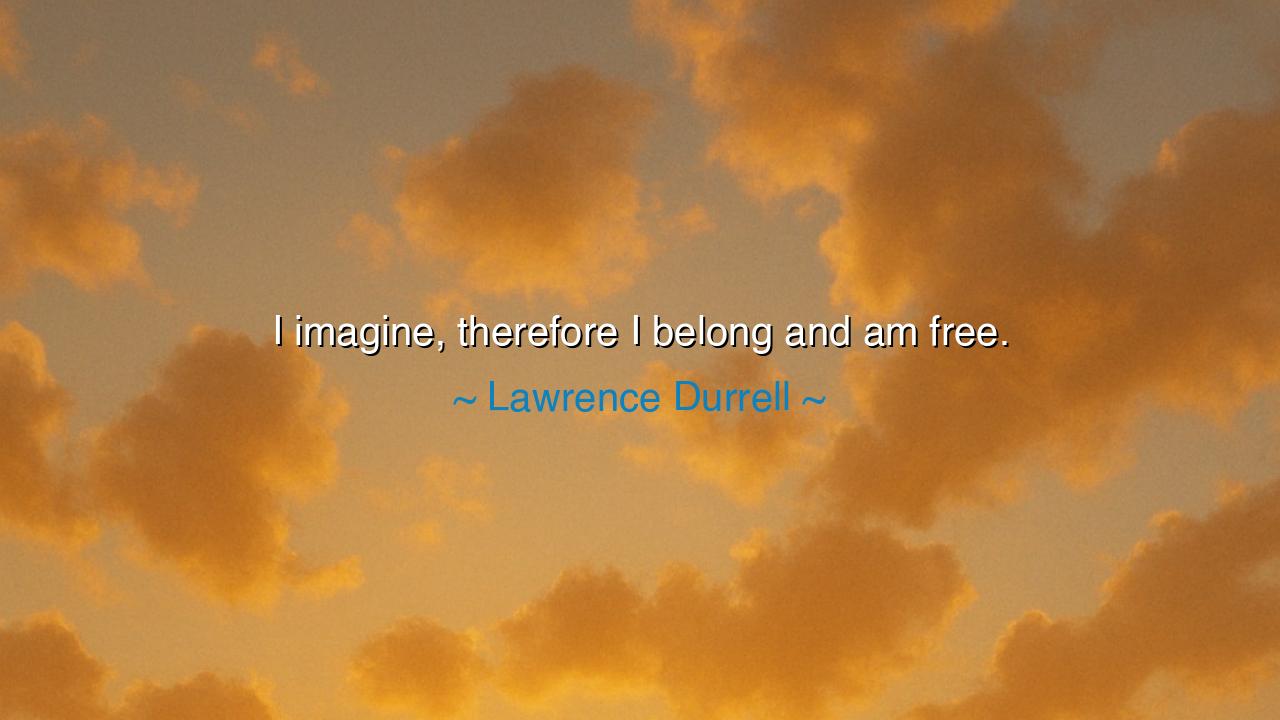
I imagine, therefore I belong and am free.






The poet Lawrence Durrell, in the radiant simplicity of his words—“I imagine, therefore I belong and am free”—speaks a truth older than time, a revelation carved into the very nature of the human spirit. In this saying, the act of imagination becomes not a mere dream or illusion, but the foundation of belonging and the essence of freedom. It is as if Durrell reaches beyond philosophy itself, answering Descartes’ cold logic—“I think, therefore I am”—with something warmer, more human, more divine. Thought may prove existence, but imagination gives it meaning. It binds the soul to the world, and at the same time, it unbinds it from chains.
For it is through imagination that we dwell in places we have not yet seen, love what we have not yet known, and create what has never before existed. The body may be confined by walls, the nation by borders, the age by circumstance—but the mind that imagines knows no captivity. Those who can imagine do not simply endure their lives; they shape them. In every generation, it is the dreamers who build the invisible bridges between despair and hope, between isolation and belonging. And so Durrell teaches: to imagine is to belong—to the world, to humanity, to the infinite unfolding of creation itself.
Consider the story of Nelson Mandela, who, imprisoned for twenty-seven years, was denied the outer freedoms of movement and speech. Yet even in the depths of Robben Island, he imagined a nation reborn. He envisioned not revenge, but reconciliation; not division, but unity. His imagination sustained him when all else was stripped away. In that narrow cell, his spirit was bound by iron, yet his mind wandered the future plains of South Africa, where his people would one day walk in dignity. He imagined, therefore he belonged—not to a prison, but to his people, and through that belonging, he was truly free.
So too, the ancient prophets and poets—Homer, Isaiah, Rumi—understood this sacred power. They saw the invisible and gave it form through words. Their imagination was the seed of civilization. Before there were cities, there were visions. Before there were laws, there were stories. Before there was belonging in community, there was belonging in the dream. For what is freedom, if not the power to see beyond what is and reach for what might be? The chains of circumstance fall away when the heart begins to imagine its own liberation.
But there is another wisdom hidden here. To belong is not to conform, nor to surrender oneself to the crowd. It is to know one’s place in the great weaving of existence—to feel the pulse of life within all things and to recognize it as kin. When one imagines, one touches the divine thread that binds all living souls. Imagination is the bridge between the self and the world, between isolation and communion. It reveals that we are not exiles, but participants in the cosmic design. To imagine deeply is to awaken the sense of belonging that no exile, no loss, no rejection can destroy.
And thus, Durrell’s words carry a hidden heroism. For to imagine in a world that would rather have you forget, to dream when cynicism rules, is itself an act of rebellion. Imagination is the soul’s sword against despair. It is the voice that whispers, “I am more than my suffering; I am a creator.” When the ancient builders raised their temples to the gods, they were not just stacking stones—they were giving form to their dreams. So too must we build temples within, sanctuaries of imagination, where the spirit may dwell unchained.
The lesson, then, is this: Guard your imagination as you would your freedom, for they are one and the same. When life narrows around you—when duties weigh heavy, when fear closes its grip—turn inward and imagine. Picture what peace would look like, what courage would feel like, what love could build. Let that vision guide your actions, however small. To imagine is to begin, to belong is to continue, to be free is to live fully in the world you have helped to create.
And so, remember these words not as poetry alone, but as a commandment for the heart: Imagine boldly. Belong deeply. Live freely. For the moment you begin to imagine, you awaken the divine spark within you—the same spark that has moved prophets, poets, and dreamers since the dawn of time.






AAdministratorAdministrator
Welcome, honored guests. Please leave a comment, we will respond soon